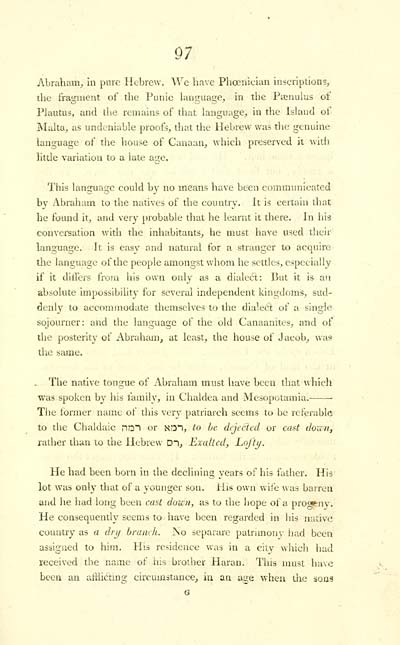Blair Collection > Celtic researches, on the origin, traditions & language, of the ancient Britons
(187)
Download files
Complete book:
Individual page:
Thumbnail gallery: Grid view | List view

P7
AbrahaiTij in pure Hebrew. \Ve have Phoenician inscriptions,
the fragment of the Punic Umguage, in the Peeuuhis of
PJautus, and the remains of that language^ in the Island of
Multa^ as undeniable proofs, that the Hebrew was tlie genuine
language of the house of Canaan, which preserved it wiiii
little variation to a late age.
This language could by no means have been communicated
b}' Abraham to the natives of the country, it is certain that
he found it, and very probable that he learnt it there. In his
conversation with the inhabitants, he must have used tlieir
language. It is easy and natural for a stranger to acquire
the language of the people amongst whom he settles, especially
if it ditfers from his own only as a dialect: But it is an
absolute impossibiUt}' for several independent kingdoms, sud-
denl}^ to accommodate themselves to the dialect of a single
sojourner: and the language of the old Canaanites, and of
the posterity of Abraham, at least, the house of Jacob, was
tlie same.
. The native tongue of Abraham must have been that which
was spoken by his family, in Chaldea and Mesopotamia. •
The former name of this verj^ patriarch seems to be referable
to the Chaldaic ΠΏΊ or ΝΏΊ, to he dejected or cast doziu,
rather than to the Hebrew D"), Exalted, LoJ'ti/.
He had been born in the declining years of his father. His
lot was only that of a younger son. His own wife was barren
and he had long been cast dozen, as to the hope of a prooieny.
He consequently seems to have been regarded in his native
country as a dry branch. No separare palrimonv had been
assigned to him. His residence was in a city which had
received the name of his brother Haran. This must have
been an atìlictmg circumstance, in an age when the sons
6
AbrahaiTij in pure Hebrew. \Ve have Phoenician inscriptions,
the fragment of the Punic Umguage, in the Peeuuhis of
PJautus, and the remains of that language^ in the Island of
Multa^ as undeniable proofs, that the Hebrew was tlie genuine
language of the house of Canaan, which preserved it wiiii
little variation to a late age.
This language could by no means have been communicated
b}' Abraham to the natives of the country, it is certain that
he found it, and very probable that he learnt it there. In his
conversation with the inhabitants, he must have used tlieir
language. It is easy and natural for a stranger to acquire
the language of the people amongst whom he settles, especially
if it ditfers from his own only as a dialect: But it is an
absolute impossibiUt}' for several independent kingdoms, sud-
denl}^ to accommodate themselves to the dialect of a single
sojourner: and the language of the old Canaanites, and of
the posterity of Abraham, at least, the house of Jacob, was
tlie same.
. The native tongue of Abraham must have been that which
was spoken by his family, in Chaldea and Mesopotamia. •
The former name of this verj^ patriarch seems to be referable
to the Chaldaic ΠΏΊ or ΝΏΊ, to he dejected or cast doziu,
rather than to the Hebrew D"), Exalted, LoJ'ti/.
He had been born in the declining years of his father. His
lot was only that of a younger son. His own wife was barren
and he had long been cast dozen, as to the hope of a prooieny.
He consequently seems to have been regarded in his native
country as a dry branch. No separare palrimonv had been
assigned to him. His residence was in a city which had
received the name of his brother Haran. This must have
been an atìlictmg circumstance, in an age when the sons
6
Set display mode to: Large image | Transcription
Images and transcriptions on this page, including medium image downloads, may be used under the Creative Commons Attribution 4.0 International Licence unless otherwise stated. ![]()
| Early Gaelic Book Collections > Blair Collection > Celtic researches, on the origin, traditions & language, of the ancient Britons > (187) |
|---|
| Permanent URL | https://digital.nls.uk/75765938 |
|---|
| Description | A selection of books from a collection of more than 500 titles, mostly on religious and literary topics. Also includes some material dealing with other Celtic languages and societies. Collection created towards the end of the 19th century by Lady Evelyn Stewart Murray. |
|---|
| Description | Selected items from five 'Special and Named Printed Collections'. Includes books in Gaelic and other Celtic languages, works about the Gaels, their languages, literature, culture and history. |
|---|

